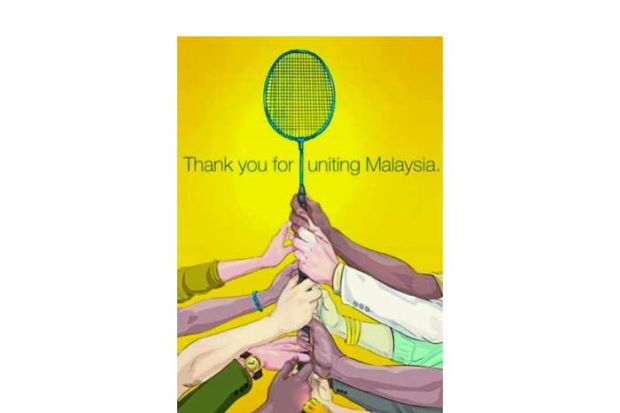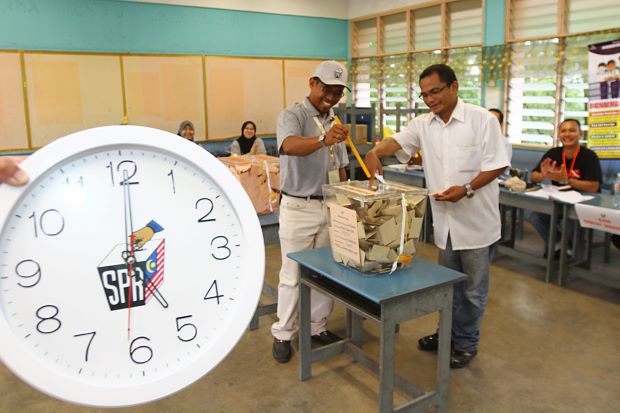
Well done: Wong presenting a framed copy of The Star’s front-page showing Lee winning the silver in the badminton men’s singles final in the Rio Olympics.
Through his tough childhood and back-breaking training, Chong Wei has never lost sight of what matters most – self-discipline.
HE is truly an incredible man. And his journey is simply amazing. Badminton legend Datuk Lee Chong Wei is where he is today because of sheer determination and consistent discipline.
We watch his dazzling displays on the courts but are not aware of the long and strenuous hours he has to put in to be our Malaysian hero today.
He sleeps by 10 every night and is up by five. After he finishes his breakfast at seven, it is a whole day of non-stop regimented exercises.
This has been his pattern since he was 16 years old when he was admitted into the National Sports College in Kuala Lumpur.
At college, his day began at 5am and he was taken through various training programmes until 6.45am. After his shower and breakfast, normal school class would begin. Training would resume at 3pm and last until 6.30pm.
This is the man who not only has to lift weights and go through other forms of exercises, but often runs up and down the 272 steps of the Batu Caves temple to keep fit. For Lee, a run up and down is regarded as one set, not two.
The only day off for Lee, like for most ordinary Malaysians, is on Sunday when he spends time with his family. He is extremely careful with what he eats. He stays away completely from oily food and that is reflected on his body. There is almost not an ounce of fat, as we can see.
Tough has been the word he learnt from an early age, where he spent his childhood in Jelutong and Teluk Bahang before moving to Bukit Mertajam.
On Thursday, a group of Penangites, who live and work in Kuala Lumpur, hosted Lee to a dinner at a restaurant at the Bangsar Shopping Centre.
They were his hardcore fans, mostly businessmen, who wanted to pay tribute to this man who has shown them the meaning of patience, determination, perseverance and discipline.
It was just on Wednesday that Lee had arrived to a VVIP welcome, together with the other Rio Games medallists, at the KL International Airport where he was greeted by hundreds of fans after a gruelling journey.
The team had flown from Rio de Janeiro to Sao Paulo for a seven-hour wait before flying to Dubai on a 14-hour journey. There was more waiting time before the last leg of the flight home.
But the experienced traveller appeared fresh and well-rested when we had our fusion Japanese dinner. Naturally, when Penangites get together, much of the conversation was in Penang Hokkien and the subject of Penang food obviously cropped up.
As the evening progressed, we could see in Lee the qualities of a winner and it is something that even the Harvard Business School would not be able to teach.
Coming from a poor family, Lee spent most of his childhood days playing basketball, which was his favourite sport. But his mother and friends wanted him to play badminton instead, complaining of the many hours under the scorching sun if he had remained in basketball.
In his book Dare To Be A Champion, Lee recalled that his arrival into the family was difficult and that he was regarded as a burden to the family.
“Friends and relatives were concerned about us and they suggested mum and dad to consider giving me away,” he wrote. “But my mum disagreed and said she would never do that no matter how hard life was going to be.”
Drawing comparison to his mother, he wrote that “every time mum talked about it, I saw her persistence, her firm belief in family values and as a mother, her natural instinct to protect her own children. I think I bear some resemblance to my mum.
“The way I fight for things that I want, how I spare no effort to get them, and my perseverance. That’s exactly how my mum is.”
Recalling his early badminton days as a student champion, Lee said he did not start off well but he didn’t quit.
He was also regarded as too short and that is also obvious, even now, when he competes against his taller Chinese opponents. But that did not deter Lee.
In college, to prove himself and to catch up with his older mates, he decided to spend twice as much time practising to reach their level.
He would stay on to practise alone. Lee wrote, “even when my hands were blistered” and the “blisters turned into calluses”.
“My hands were sore but I bore with it, as I knew eventually I would reach the fruitful end.”
But while his badminton records are well recorded, many people should also understand how he keeps himself mentally prepared. This is especially important in the international arena where he has to make last-minute changes in strategy to catch the opponent off-guard.
Malaysian politicians are fond of using the term “world class” because they sound good and they want to be remembered for setting lofty targets, but we know most of the time the projects end miserably.
But Lee is surely world class and all that is possible because he has worked hard.
He added that “these records were the outcome of my perseverance in challenging my body and mind continuously to the limit.
“I can never loosen my self-discipline. It is how I have managed to set those records, by working hard, by training every day. Although sometimes I have failed, but inside my mind, I clearly understand that failure actually makes me stronger.
“Losing is winning. People claim that I fear my opponents. In fact, a winner always fears being defeated or to be overtaken. As long as we face our failure with a right mindset and attitude, we will still be on the right course to success,” he wrote.
If Lee has accumulated wealth for his many years of playing as a full time player, whether via sponsorship or prize earnings, he deserves it all.
For Lee, as we celebrate the National Day, he has been a true Malaysian champion. At a time when some politicians fail miserably in their duties, preferring to use race and religion to cling on desperately, he and his team-mates have brought Malaysians together.
He provides hope to Malaysians and has shown us that perseverance and hard work can make us world class, not mere rhetoric.
Thank you Datuk Lee Chong Wei! Respect!








